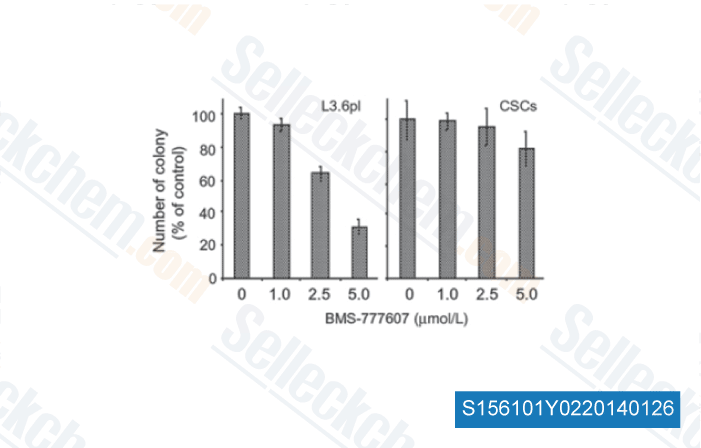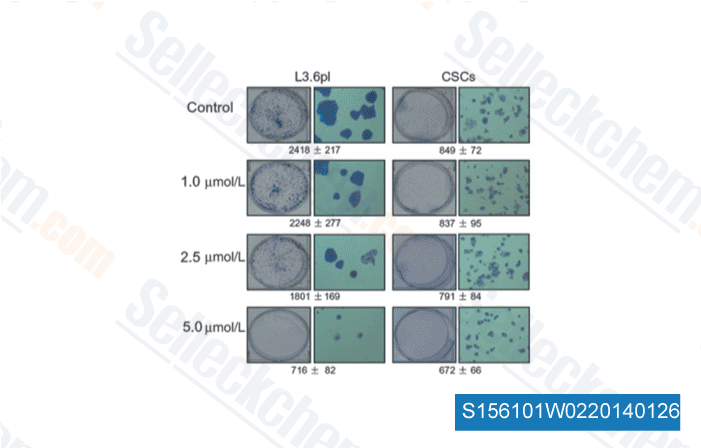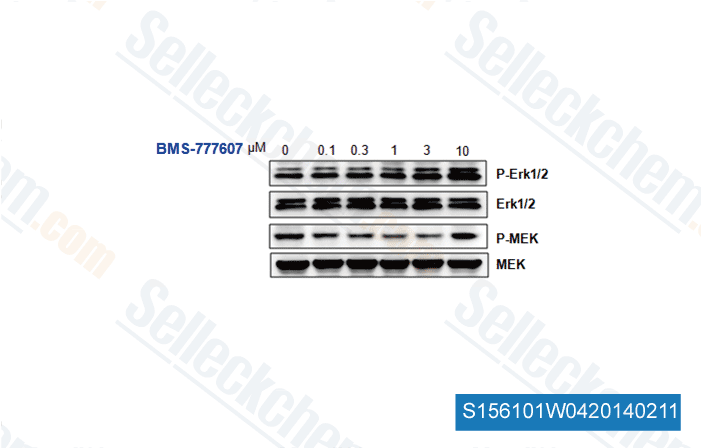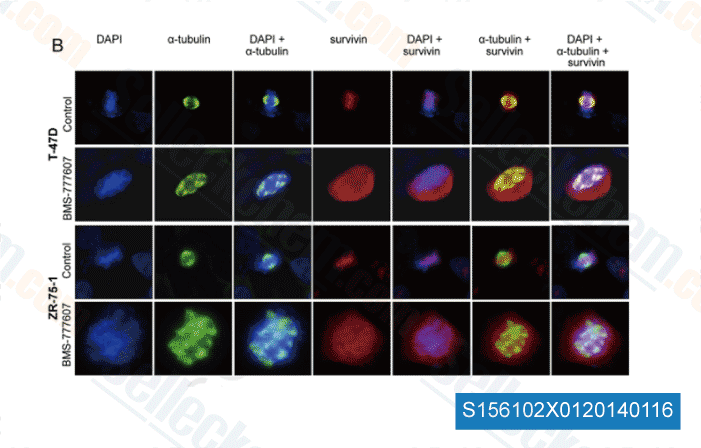|
How to Cite 1. For In-Text Citation (Materials & Methods): 2. For Key Resources Table: |
||
|
Toll Free: (877) 796-6397 -- USA and Canada only -- |
Fax: +1-832-582-8590 Orders: +1-832-582-8158 |
Tech Support: +1-832-582-8158 Ext:3 Please provide your Order Number in the email. We strive to reply to |
Technical Data
| Formula | C25H19ClF2N4O4 |
||||||
| Molecular Weight | 512.89 | CAS No. | 1025720-94-8 | ||||
| Solubility (25°C)* | In vitro | DMSO | 100 mg/mL (194.97 mM) | ||||
| Water | Insoluble | ||||||
| Ethanol | Insoluble | ||||||
| In vivo (Add solvents to the product individually and in order) |
|
||||||
|
* <1 mg/ml means slightly soluble or insoluble. * Please note that Selleck tests the solubility of all compounds in-house, and the actual solubility may differ slightly from published values. This is normal and is due to slight batch-to-batch variations. * Room temperature shipping (Stability testing shows this product can be shipped without any cooling measures.) |
|||||||
Preparing Stock Solutions
Biological Activity
| Description | BMS-777607 (BMS 817378) is a Met-related inhibitor for c-Met, Axl, Ron and Tyro3 with IC50 of 3.9 nM, 1.1 nM, 1.8 nM and 4.3 nM in cell-free assays, 40-fold more selective for Met-related targets versus Lck, VEGFR-2, and TrkA/B, and more than 500-fold greater selectivity versus all other receptor and non receptor kinases. | |||||||||||
|---|---|---|---|---|---|---|---|---|---|---|---|---|
| Targets |
|
|||||||||||
| In vitro | BMS-777607 is a selective ATP-competitive Met kinase inhibitor which potently blocks the autophosphorylation of c-Met with IC50 of 20 nM in GTL-16 cell lysates, and demonstrates selective inhibition of proliferation in Met-driven tumor cell lines, such as GTL-16 cell line, H1993 and U87. This compound inhibits hepatocyte growth factor (HGF)-triggered c-Met autophosphorylation with IC50 of <1 nM in PC-3 and DU145 prostate cancer cells. This compound has little effect on tumor cell growth, but exhibits inhibitory effect on HGF-induced cell scattering in PC-3 and DU145 cells, with almost complete inhibition at 0.5 μM. It also suppresses stimulated cell migration and invasion in a dose-dependent fashion (IC50 < 0.1 μM) in both cell lines. Application of this compound (~10 μM) to the highly metastatic murine KHT cells for 2 hours potently eliminates basal levels of autophosphorylated c-Met with IC50 of 10 nM without affecting the total c-Met, leading to dose-dependent inhibition of phosphorylation of downstream signaling molecules including ERK, Akt, p70S6K and S6. Treatment with this compound (~1 μM) for 24 hours potently inhibits the KHT cell scatter, motility and invasion at doses in the nanomolar range which consists with MET gene knockdown, and modestly affects cell proliferation and colony formation. |
|||||||||||
| In vivo | Oral administration of BMS 777607 (6.25-50 mg/kg) significantly reduces tumor volumes of the GTL-16 human tumor xenografts in athymic mice with no observed toxicity. Administration of this compound (25 mg/kg/day) decreases the number of KHT lung tumor nodules (28.3%), improves the morphological hemorrhage, and significantly impairs the metastatic phenotype in the 6-8 week-old female C3H/HeJ mice injected with rodent fibrosarcoma KHT cells without apparent systemic toxicity compared to the control treatment. A low dose of this chemical (10 mg/kg) also offers a mild but not significant inhibition of lung nodule formation compared to the vehicle control. |
|||||||||||
| Features | A potent inhibitor of the Met family, and >40-fold selectivity vs. Lck, VEGFR2, and TrkA/B and >500-fold selective vs. other receptor and non-receptor kinases. |
Protocol (from reference)
| Kinase Assay: |
|
|---|---|
| Cell Assay: |
|
| Animal Study: |
|
References
|
Customer Product Validation

-
Data from [ Mol Cancer Ther , 2014 , 13(1), 37-48 ]

-
Data from [ Mol Cancer Ther , 2014 , 13(1), 37-48 ]

-
, 2014 , Dr.Wang from Southern Medical Hospital

-
Data from [ Mol Oncol , 2013 , 10.1016/j.molonc.2013.12.014 ]
Selleck's BMS-777607 Has Been Cited by 64 Publications
| Plasma extracellular vesicle surface-located GAS6/PROS1 and CD39/CD73 attenuate inflammation [ Cell Rep, 2025, 44(8):116096] | PubMed: 40751911 |
| Axl inhibitor-mediated reprogramming of the myeloid compartment of the in vitro tumor microenvironment is influenced by prior targeted therapy treatment [ Front Immunol, 2025, 16:1601420] | PubMed: 40539073 |
| Polychlorinated Biphenyls Alter Estrogen Receptor β-mediated Epigenetic Regulation, Promoting Endometriosis [ Endocrinology, 2025, 166(11)bqaf146] | PubMed: 41054802 |
| Repurposing of the Syk inhibitor fostamatinib using a machine learning algorithm [ Exp Ther Med, 2025, 29(6):110] | PubMed: 40242601 |
| Polychlorinated Biphenyl-126 Activates AXL/ERb/DNMT3A Axis to Drive Endometriosis Progression [ Res Sq, 2025, rs.3.rs-6631264] | PubMed: 40470214 |
| AXL signal mediates adaptive resistance to KRAS G12C inhibitors in KRAS G12C-mutant tumor cells [ Cancer Lett, 2024, 587:216692] | PubMed: 38342232 |
| RON receptor tyrosine kinase as a critical determinant in promoting tumorigenic behaviors of bladder cancer cells through regulating MMP12 and HIF-2α pathways [ Cell Death Dis, 2024, 15(11):844] | PubMed: 39557851 |
| Inhibition of AXL receptor tyrosine kinase enhances brown adipose tissue functionality in mice [ Nat Commun, 2023, 14(1):4162] | PubMed: 37443109 |
| RON-augmented cholesterol biosynthesis in breast cancer metastatic progression and recurrence [ Oncogene, 2023, 42(21):1716-1727] | PubMed: 37029299 |
| EGFR-phosphorylated GDH1 harmonizes with RSK2 to drive CREB activation and tumor metastasis in EGFR-activated lung cancer [ Cell Rep, 2022, 41(11):111827] | PubMed: 36516759 |
RETURN POLICY
Selleck Chemical’s Unconditional Return Policy ensures a smooth online shopping experience for our customers. If you are in any way unsatisfied with your purchase, you may return any item(s) within 7 days of receiving it. In the event of product quality issues, either protocol related or product related problems, you may return any item(s) within 365 days from the original purchase date. Please follow the instructions below when returning products.
SHIPPING AND STORAGE
Selleck products are transported at room temperature. If you receive the product at room temperature, please rest assured, the Selleck Quality Inspection Department has conducted experiments to verify that the normal temperature placement of one month will not affect the biological activity of powder products. After collecting, please store the product according to the requirements described in the datasheet. Most Selleck products are stable under the recommended conditions.
NOT FOR HUMAN, VETERINARY DIAGNOSTIC OR THERAPEUTIC USE.
